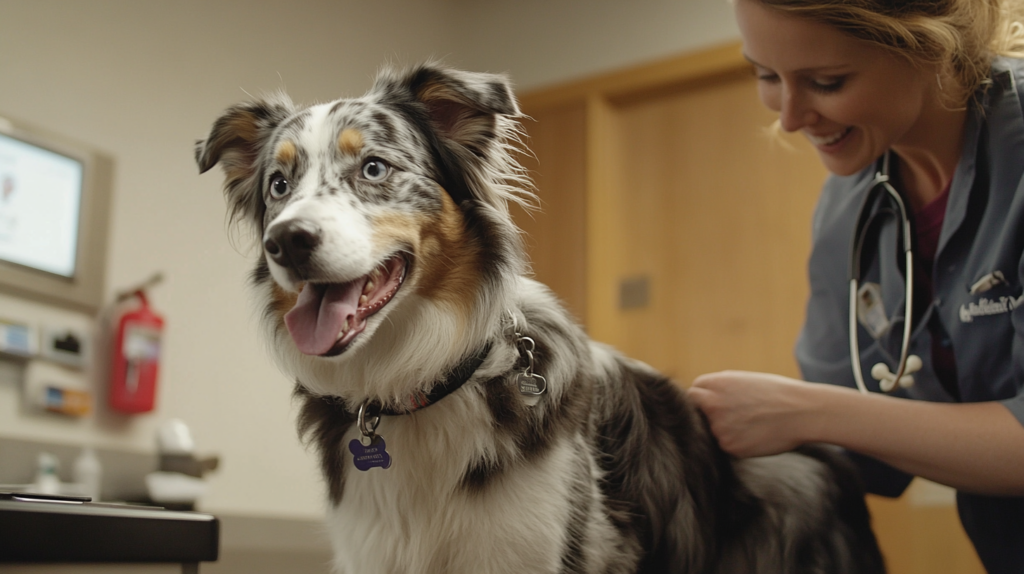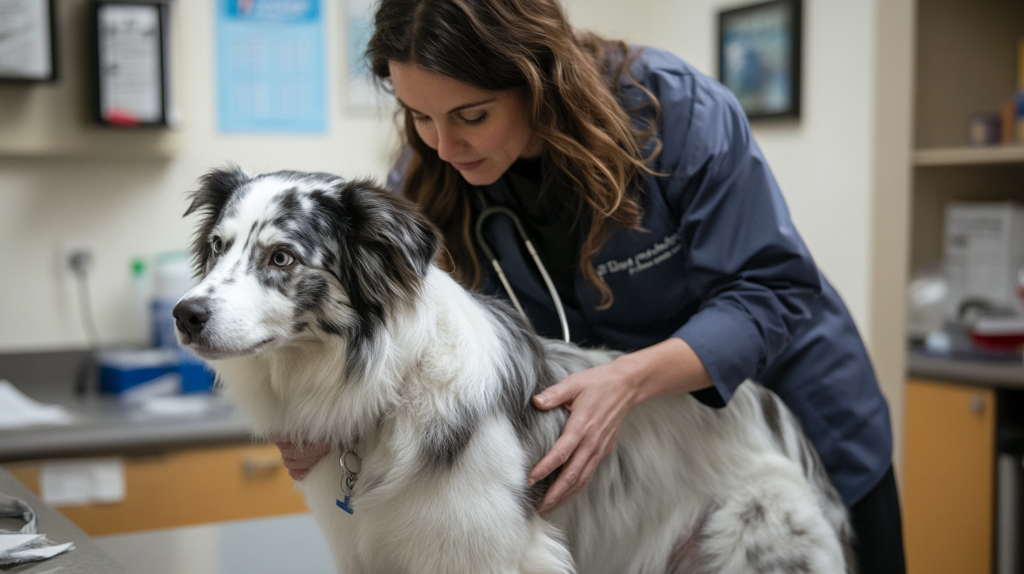Australian Shepherd Health: Common Issues and Prevention Guide
The Australian Shepherd is a medium-sized dog known for its lively spirit and boundless energy. Originally bred for herding livestock, Aussies are intelligent, athletic, and fiercely loyal companions, making them perfect for active families. Their playful nature also makes them popular pets.
However, like any breed, it’s important to understand Australian Shepherd health problems in order to ensure their well-being and longevity. Being aware of common health issues in Australian Shepherds can help owners provide the best care possible.
In this article, we will explore:
- Prevalent Aussie dog health issues such as hip dysplasia and eye diseases.
- Symptoms to watch for that may indicate health problems.
- Prevention tips to help extend the Australian Shepherd lifespan through proper care and genetic testing.
By understanding these aspects of Australian Shepherd health, you can empower yourself to keep your furry friend happy and healthy!

Common Health Issues in Australian Shepherds
1. Hip and Elbow Dysplasia
Australian Shepherds, with their boundless energy and enthusiasm, can be at risk for hip and elbow dysplasia, a common inherited condition. This occurs when the joints do not fit properly into the hip or elbow socket, leading to malalignment, arthritis, and significant pain over time. The discomfort can impact mobility, making it challenging for your Aussie to engage in their favorite activities like running or jumping.
Symptoms to Watch For
Being aware of the signs of dysplasia is crucial for early intervention. Look for:
- Lameness: Your dog may favor one leg or show reluctance to run.
- Difficulty getting up: Struggling to rise after resting can indicate joint pain.
- Climbing stairs: Hesitation or inability to ascend or descend stairs is a red flag.
- Decreased activity levels: A suddenly less playful pup might be experiencing discomfort.
Diagnosis Methods
If you suspect your Australian Shepherd may have hip or elbow dysplasia, consulting a veterinarian is essential. Diagnostic methods typically include:
- X-rays: These provide clear images of the joints, allowing your vet to assess any abnormalities.
- Physical examination: A thorough check of your dog’s limbs and movement can also help pinpoint issues.
Treatment Options
Once diagnosed, treatment options vary based on severity but often include:
- Weight Management: Maintaining a healthy weight minimizes pressure on joints.
- Physical Therapy: Tailored exercises can strengthen muscles supporting the joints.
- Medications: Pain relief medications or anti-inflammatories may be prescribed to manage discomfort.
- Surgical Interventions: In severe cases, procedures like joint replacement might be necessary.
Understanding these health issues is vital for any Aussie owner. By keeping an eye out for symptoms and seeking timely veterinary care, you can help ensure that your furry friend enjoys a long, active life free from pain and mobility challenges.

2. Eye Diseases
Australian Shepherds are not just known for their intelligence and athleticism; they can also face a range of Aussie eye problems that may affect their quality of life. Here’s a closer look at some common eye diseases affecting this breed:
Common Eye Diseases in Australian Shepherds
- Progressive Retinal Atrophy (PRA): A degenerative disease leading to vision loss, PRA is often inherited. The retina deteriorates over time, resulting in night blindness followed by day blindness.
- Hereditary Cataracts: These can develop in young Australian Shepherds and lead to cloudy lenses, impairing vision. Early detection is crucial as surgical intervention is the only treatment option.
- Collie Eye Anomaly: This genetic condition affects the development of the eye and can result in various vision problems.
Signs of Eye Problems
Watch for these indicators that could signal an issue:
- Cloudy or blurry vision
- Excessive tearing or discharge
- Rubbing or pawing at the eyes
Regular check-ups with a veterinary ophthalmologist are essential for early detection and management of these conditions. Routine exams can catch potential issues before they escalate, ensuring your Aussie remains a happy, active companion.
Being proactive about Australian Shepherd health, especially regarding genetic diseases like eye disorders, enables owners to provide the best care possible. Understanding these issues helps in fostering a long, fulfilling life for your furry friend while minimizing the impact of skin allergies in dogs or other health concerns that may arise.

3. Epilepsy
Epilepsy is a neurological disorder that can cause recurrent seizures in dogs, including our beloved Australian Shepherds. These episodes can vary in frequency and intensity, making it essential for owners to recognize the epilepsy symptoms in dogs. Signs may include:
- Uncontrolled shaking or convulsions
- Stiffening of the body
- Sudden disorientation or loss of consciousness
Various factors can trigger seizures in Australian Shepherds. Genetic predisposition plays a significant role, as certain lines may have a higher likelihood of developing epilepsy. Additionally, exposure to toxins—such as some household chemicals or certain plants—can provoke an episode.
Management strategies are vital for maintaining a quality life for affected dogs. Common approaches include:
- Antiepileptic medications: Prescribed by veterinarians to help control seizure activity.
- Regular veterinary check-ups: Essential for monitoring medication levels and adjusting dosages as needed.
- Maintaining a stable environment: Reducing stressors that might trigger seizures.
Proactive care is crucial for all Australian Shepherds, not just those showing signs of epilepsy. Awareness of health issues such as Aussie hip dysplasia, Aussie eye problems, and even skin allergies in dogs enhances overall well-being. Keeping a close eye on your furry friend and seeking timely veterinary advice creates a pathway to healthier lives, ensuring they remain active and happy companions.

4. Multiple Drug Sensitivity (MDS)
Australian Shepherds are not just adorable and energetic; they also come with a unique set of health considerations. One of these concerns is Multiple Drug Sensitivity (MDS), a condition that can put your Aussie at risk when it comes to medication.
What is MDS?
MDS occurs due to a mutation in the MDR1 gene found in Australian Shepherds. This mutation makes affected dogs particularly sensitive to certain drugs, which can lead to severe adverse reactions. Medications commonly associated with MDS include some used for treating parasites and other veterinary applications.
Testing for MDS
Testing for MDS is straightforward and can be done through:
- A simple cheek swab
- A blood sample analysis
Both methods are performed by a veterinary laboratory and help determine if your pup carries the MDR1 gene mutation. Knowing about multiple drug sensitivity in dogs can significantly influence treatment options and ensure your furry friend receives safe care.
Owners of Australian Shepherds should stay vigilant about this condition, especially when considering medications for various health issues such as skin allergies in dogs or even managing epilepsy symptoms in dogs. Understanding MDS can empower you to advocate for your dog’s health effectively, ensuring they receive the appropriate treatments without compromising their safety.
Awareness of this condition plays a vital role in proactive care, allowing Australian Shepherd owners to make informed decisions about their pets’ health.

5. Skin Problems
Australian Shepherds, with their beautiful double-layer coats, can face a variety of skin issues. Common culprits include:
- Itchiness: Often caused by allergies, leading to constant scratching or biting at the skin.
- Hot Spots: These painful, inflamed areas can develop quickly due to moisture or irritation.
- Ear Infections: Moisture and wax build-up can create a breeding ground for bacteria and yeast.
The prevalence of these skin problems in Australian Shepherds emphasizes the need for proactive care from owners. Here are some preventative care tips to keep your Aussie feeling comfortable and healthy:
- Regular Grooming: Frequent brushing helps remove loose fur and dander, reducing allergens in your home. It also promotes skin health and blood circulation.
- Balanced Diet: Ensure your dog’s diet is rich in essential fatty acids. Ingredients like fish oil can help maintain a shiny coat and minimize skin irritations.
- Routine Check-ups: Regular veterinary visits allow for early detection of skin issues and prompt treatment.
- Avoiding Allergens: Be mindful of environmental factors such as pollen, dust mites, or certain foods that may trigger allergic reactions.
By being attentive to these common skin problems and implementing preventive measures, you can help your Australian Shepherd lead a happier, itch-free life. Understanding the intricacies of Aussie hip dysplasia or knowing about multiple drug sensitivity in dogs is essential. A proactive approach to Australian Shepherd health ensures that your furry friend remains a vibrant part of your family for years to come!

6. Anxiety Disorders
Australian Shepherds can be sensitive souls, often experiencing anxiety that manifests in various behaviors. Recognizing these symptoms is essential for ensuring your furry friend lives a happy and stress-free life. Common signs of anxiety in Australian Shepherds include:
- Excessive barking: This may signal distress or frustration.
- Destructive behavior: Chewing or scratching furniture when left alone reflects feelings of insecurity.
- Fearfulness: Many Aussies might tremble or hide during thunderstorms or fireworks, showcasing their sensitivity to loud noises.
Understanding these behaviors allows owners to take proactive measures to help their beloved pets feel secure. Here are some strategies to manage anxiety effectively:
- Provide a safe space: Create a cozy environment where your Aussie can retreat during stressful situations. This could be a quiet room with their favorite blanket and toys.
- Routine: Establishing a consistent daily schedule for feeding, walks, and playtime can instill a sense of predictability.
- Mental stimulation: Engage your dog with puzzle toys or training sessions to keep their mind occupied and reduce anxiety levels.
- Desensitization: Gradually exposing your dog to the sounds or situations that cause fear can help them adapt over time.
- Professional help: If anxiety persists despite these strategies, consulting with a veterinarian or animal behaviorist can provide tailored solutions, including potential medication options.
Recognizing and addressing anxiety in Australian Shepherds is vital for their well-being, especially considering other health issues like Aussie hip dysplasia, Aussie eye problems, and skin allergies in dogs. Your attentiveness will contribute significantly to a happier and healthier life for your four-legged companion.

7. Deafness
Deafness in Australian Shepherds can be a silent but significant issue, especially prevalent among certain coat color variations, such as double-merle Aussies. This genetic condition arises due to the mutations associated with their unique coat patterns and can lead to varying degrees of hearing loss.
Understanding Deafness
- Double-Merle Variants: These dogs often exhibit a higher incidence of deafness due to their genetic makeup. It’s essential for owners of these stunning pups to be aware of this potential health concern.
Diagnostic Methods
To confirm suspected hearing loss, a specialized test called BAER testing (Brainstem Auditory Evoked Response) is employed. This non-invasive procedure helps determine the dog’s ability to hear sounds at different frequencies. A veterinarian or a certified audiologist typically conducts this test, providing vital information about your Aussie’s auditory capabilities.
Proactive Care
Awareness of deafness is key for effective management. Owners should:
- Regularly monitor their dog’s responses to sounds
- Provide visual cues for commands, ensuring communication remains clear
- Maintain safety in environments where hearing loss could pose risks
Understanding common health issues faced by Australian Shepherds—including Aussie hip dysplasia, Aussie eye problems, and skin allergies in dogs—highlights the importance of proactive care from owners. Conducting regular health checks and seeking appropriate veterinary advice can aid in early detection and management of conditions like Australian Shepherd epilepsy and multiple drug sensitivity linked to the MDR1 gene.
By remaining vigilant and informed, you can help foster a happy, healthy life for your dear Aussie companion.
8. Cancer Risks
Australian Shepherds, while energetic and intelligent companions, are not immune to the insidious threat of cancer. As these lovable pups age, they become more susceptible to certain types of cancers that can dramatically affect their quality of life. Here’s what every owner should know:
Common Types of Cancer
- Lymphosarcoma: A frequent diagnosis in older Australian Shepherds, this cancer affects the lymphatic system and can present with symptoms like swollen lymph nodes or weight loss.
- Hemangiosarcoma: This aggressive cancer arises from blood vessels and often goes unnoticed until it reaches an advanced stage, leading to sudden health declines.
Importance of Routine Check-Ups
Regular veterinary visits play a crucial role in early detection. During these check-ups, your vet can perform necessary screenings to catch issues before they become critical. Early intervention is key; many treatment options remain effective if cancer is detected early.
Proactive Care Strategies
Owners should stay vigilant for any unusual changes in behavior or physical condition in their furry friends. Symptoms such as lethargy, unexplained weight changes, or persistent vomiting warrant immediate veterinary attention.
Staying informed about common health issues—like Aussie hip dysplasia, epilepsy symptoms in dogs, and skin allergies in dogs—provides a solid foundation for ensuring the well-being of your Australian Shepherd. The earlier you act, the better the chances for successful treatment and a longer, happier life for your beloved companion.

Genetic Diseases Affecting The Breed
Hereditary Conditions
Australian Shepherds, known for their intelligence and lively spirit, also carry a genetic burden that can affect their health. Understanding these hereditary conditions is crucial for owners to ensure the long-term well-being of their furry companions.
Common hereditary conditions in Australian Shepherds include:
- Progressive Retinal Atrophy (PRA): This group of inherited eye diseases leads to gradual vision loss and can ultimately result in blindness. Symptoms often go unnoticed until the dog shows signs of difficulty navigating familiar environments. Regular veterinary ophthalmologist check-ups are essential for early detection.
- Hereditary Cataracts: Affects dogs typically aged between 1 and 5 years, causing cloudiness in the lens of the eye. If left untreated, cataracts can lead to blindness. Surgical intervention is the only effective treatment option available, making early diagnosis vital.
- Collie Eye Anomaly (CEA): This genetic disorder affects the development of the eye’s retina, leading to vision complications. CEA might not always manifest severe symptoms but can predispose affected dogs to more serious issues over time. Regular screenings by a veterinary ophthalmologist can help in monitoring this condition.
- Epilepsy: While epilepsy is often classified as a neurological disorder, it has a genetic component particularly prevalent in Australian Shepherds. Dogs may exhibit seizures from a young age, creating challenges for management and care. Lifelong medication may be necessary to control seizure activity.
- Multiple Drug Sensitivity (MDS): Due to a mutation in the MDR1 gene, many Australian Shepherds are hypersensitive to certain medications, especially ivermectin used for heartworm prevention. Testing through cheek swabs or blood samples can determine if your Aussie has this sensitivity before administering any drugs.
Being aware of these Aussie dog genetic diseases empowers pet parents to take preventive measures. Ensuring breeders conduct health screenings before mating can reduce the prevalence of these conditions within future generations. Regular veterinary visits further aid in identifying issues early on, allowing for timely interventions that could save your pup’s sight or overall health.
Understanding these hereditary risks enables owners to provide informed care tailored to their beloved Australian Shepherds’ unique needs.
Preventive Care For Australian Shepherds
Nutrition and Exercise for Optimal Health
Caring for an Australian Shepherd involves more than just love and attention. Achieving optimal health means focusing on proper nutrition and adequate exercise. Here’s what to keep in mind:
Proper Nutrition for Australian Shepherds
A balanced diet tailored to their needs can significantly impact your Aussie’s health. Consider the following:
- High-Quality Dog Food: Choose a high-quality commercial diet that lists meat as the first ingredient. Look for formulas specifically designed for active breeds.
- Essential Fatty Acids: Incorporate omega-3 and omega-6 fatty acids into their diet to support skin health and coat condition. Fish oil or flaxseed oil are great options.
- Age-Appropriate Feeding: Puppies, adults, and seniors have different nutritional requirements. Adjust portion sizes and ingredients accordingly.
- Hydration: Ensure fresh water is always available. Staying hydrated aids digestion and overall body function.
Adequate Exercise for Aussies
Australian Shepherds are energetic dogs that require plenty of exercise to maintain a healthy weight and well-being. Aim for:
- Daily Walks: At least two hours of exercise daily is ideal. Incorporate walks, runs, or playtime in a secure area.
- Mental Stimulation: Engage in games like fetch or hide-and-seek to keep their minds sharp. This breed thrives on challenges!
- Agility Training: Consider agility courses or obedience training classes for physical activity mixed with mental challenges.
Grooming Tips for Australian Shepherds
Regular grooming plays a vital role in keeping your Aussie healthy:
- Weekly Brushing: Their double-layer coat requires weekly brushing to reduce shedding and prevent matting.
- Bathing Routine: Bathe them every few months or as needed, using dog-specific shampoo to maintain skin balance.
- Ear Cleaning: Regularly check and clean their ears to prevent infections, especially if they have floppy ears.
Aussie Health Testing
Being proactive about health testing can help you catch potential issues early:
- Genetic Testing: Tests for conditions like Multiple Drug Sensitivity (MDS) can inform your pet care strategies.
- Routine Vet Visits: Regular check-ups allow early detection of any developing health concerns.
Understanding these aspects of Aussie preventive care helps ensure your furry friend enjoys a long, happy life filled with adventures! 🐾

Understanding Lifespan And Aging Issues
Curious about how long do Australian Shepherds live? These energetic companions typically enjoy a lifespan of 12 to 15 years. With their active lifestyle, maintaining good health throughout their golden years is essential.
As they age, Australian Shepherds may encounter common age-related issues, including:
- Arthritis: Joint pain can become more pronounced as they grow older.
- Cognitive Dysfunction Syndrome (CDS): Just like humans, dogs can experience memory loss and confusion.
- Vision Problems: Conditions like cataracts or PRA may develop over time.
Being aware of these potential challenges is crucial for every Australian Shepherd owner. Proactive measures such as regular vet check-ups, tailored nutrition, and consistent exercise can significantly enhance your dog’s quality of life.
By understanding Australian Shepherd Health: Common Issues and Prevention, you empower yourself to provide the best care for your furry friend as they age gracefully.

FAQs (Frequently Asked Questions)
What are the common health issues in Australian Shepherds?
Australian Shepherds may experience a variety of health issues, including hip and elbow dysplasia, eye diseases such as progressive retinal atrophy and hereditary cataracts, epilepsy, multiple drug sensitivity (MDS), skin allergies, and anxiety disorders. Proactive care and regular veterinary check-ups are essential for managing these conditions.
How can I identify hip and elbow dysplasia in my Australian Shepherd?
Symptoms of hip and elbow dysplasia include lameness, difficulty getting up or climbing stairs, and reduced mobility. If you notice these signs in your dog, it’s important to consult a veterinarian who can perform diagnostic tests like X-rays to confirm the condition.
What should I know about eye diseases in Australian Shepherds?
Common eye diseases in Australian Shepherds include progressive retinal atrophy (PRA) and hereditary cataracts. Signs of eye problems may include cloudy eyes or excessive tearing. Regular check-ups with a veterinary ophthalmologist are crucial for early detection and treatment of these conditions.
What is multiple drug sensitivity (MDS) in Australian Shepherds?
Multiple drug sensitivity (MDS) is a condition where affected dogs have an increased sensitivity to certain medications due to a mutation in the MDR1 gene. Testing for MDS can be done through a simple cheek swab or blood sample analysis conducted by a veterinary laboratory.
How can I manage skin allergies in my Australian Shepherd?
Managing skin allergies involves identifying triggers and providing preventative care. Owners can help by maintaining regular grooming routines, feeding a balanced diet rich in essential fatty acids, and monitoring for symptoms like itchiness or hot spots. Consulting with a veterinarian is recommended for tailored treatment options.
What are the signs of anxiety disorders in Australian Shepherds?
Signs of anxiety disorders in Australian Shepherds may include excessive barking, destructive behavior, restlessness, or withdrawal from social interactions. If you suspect your dog is experiencing anxiety, it’s important to seek advice from a veterinarian who can recommend appropriate management strategies.






